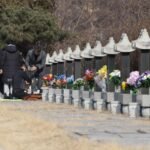Lotte Energy Materials Corp., one of South Korea’s leading battery materials makers, has completed a pilot plant for the production of sulfide-based solid electrolytes, a key component for next-generation all-solid-state batteries, the company said on Thursday.
The company invested 15 billion won ($11.2 million) in the plant at its Iksan facility in North Jeolla Province, which spans 1,619 square meters and has an annual production capacity of 70 tons of solid electrolyte.
Lotte said the plant is expected to begin trial operations at the end of this month, pending regulatory approvals, with initial sample production targeted for the end of the year.
The company’s sulfide-based solid electrolyte features advanced technologies, including high ionic conductivity, moisture stability, and both dry and wet synthesis processes.
Lotte plans to provide evaluation samples to domestic and international all-solid-state battery manufacturers after the plant’s stabilization phase.
If customer approvals and supply agreements are secured by 2025, the company aims to expand the plant to an annual production capacity of 1,200 tons in 2026, with full-scale mass production to start in 2027.
Lotte also plans to offer a comprehensive solution for solid-state batteries by integrating the electrolyte with its domestically developed nickel-plated foil.
By Hyung-Kyu Kim
khk@hankyung.com















